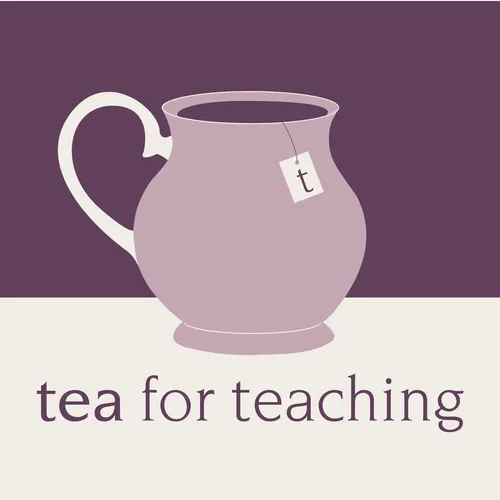
Tea for Teaching
An informal discussion of innovative and effective practices in teaching and learning. This podcast series is hosted by John Kane (an economist) and Rebecca Mushtare (a graphic designer). This podcast is produced by the Center for Excellence in Learning and Teaching at SUNY Oswego.
- Update frequency
- every 7 days
- Average duration
- 38 minutes
- Episodes
- 411
- Years Active
- 2017 - 2025

Hacking Assessment
Traditional grading systems often encourage students to focus on achieving higher grades rather than on their learning. In this episode, Starr Sackstein joins us to discuss how classes can be redesig…

Winning the First Day
Faculty that fit the cultural stereotype of a white male professor are often presumed authority figures in the classroom. Faculty that do not conform to this stereotype can face challenges in acquiri…

Reframing Academic Expertise
Professors are generally represented in popular culture as white male experts who dispense knowledge to their students through lectures. Young female professors are often encouraged to portray themse…

Picture a Professor
What does a professor look like? In popular culture the professor is white and male—a sage on the stage. In this episode Jessamyn Neuhaus joins us to discuss the role context, employment status, and …

Embedding Career Competencies
Students generally enter college to advance their employment prospects. In this episode, Jessica Kruger joins us to discuss how explicitly embedding career competencies in the curriculum can engage a…

Higher Ed’s Next Chapter
During the past two years, faculty have experimented with new teaching modalities and new teaching techniques as we adapted to the COVID pandemic. In this episode, Kevin Gannon joins us to reflect on…

Unlearning
To deepen our understanding or improve our skills, it is often necessary to question our preconceptions and unlearn some of our past practices and assumptions. In this episode, Lindsay Masland joins …

Trauma Aware Pedagogy
Since the start of the pandemic, there has been much discussion about student disengagement in their classes, but little discussion about why student engagement has declined. In this episode, Karen C…

Student Podcasts
Student research papers have been ubiquitous in higher education, but there are many ways in which students can demonstrate the skills that they have acquired. In this episode, Megan Remmel joins us …

Teaching Matters
Graduate students often receive little or no training before their first teaching experiences. In this episode, Aeron Haynie and Stephanie Spong join us to discuss the need to support graduate studen…

To Teach or Not to Teach
Faculty do not necessarily see themselves as administrators but good faculty can be valuable in administrative roles. In this episode, Kristin Croyle joins us to discuss how and why faculty become le…

Credential As You Go
Students from low-income households often encounter barriers that prevent them from completing a degree. These students are left with a large burden of student debt, limited job opportunities, and lo…

Engaged Teaching
The past two years have been challenging for teachers to navigate and be excited about. In this episode, Claire Howell Major joins us to discuss what it means to be an engaged teacher as well as prac…

Latina Educational Developers
Our intersectional identities impact our positionality in the work that we do. In this episode, Carol Hernandez joins us to discuss her qualitative research addressing the experiences of educational …

ePortfolios
As David Wiley has noted, “disposable assignments” often have small impacts on student learning. In this episode Nikki Wilson Clasby joins us to discuss how one campus has used ePortfolios to create…

Pandemic Teaching: Week 109
We take a break from our usual interview format in this episode to reflect on how our teaching has continued to evolve as we moved through a second year of pandemic teaching. We also speculate a bit …

Education in Prisons
Education provides a pathway to a more secure and comfortable future for individuals living in poverty. This is especially true for those who are incarcerated. In this episode, Em Daniels and William…

Guided Notetaking
Many college classes contain a substantial lecture component, but our students arrive at college with little or no training in taking effective notes. In this episode, Tanya Martini joins us to discu…

The EmTech MOOC
The technology tools that we use in our daily lives are constantly changing and evolving. In this episode, Cherie Van Putten and Nicole Simon join us to discuss the development of a MOOC and a wiki p…

Include Instructors in Inclusive Instruction
Educational developers often recommend teaching practices that assume instructors are in a position in which they can cede some of their authority to students in order to increase student agency and …